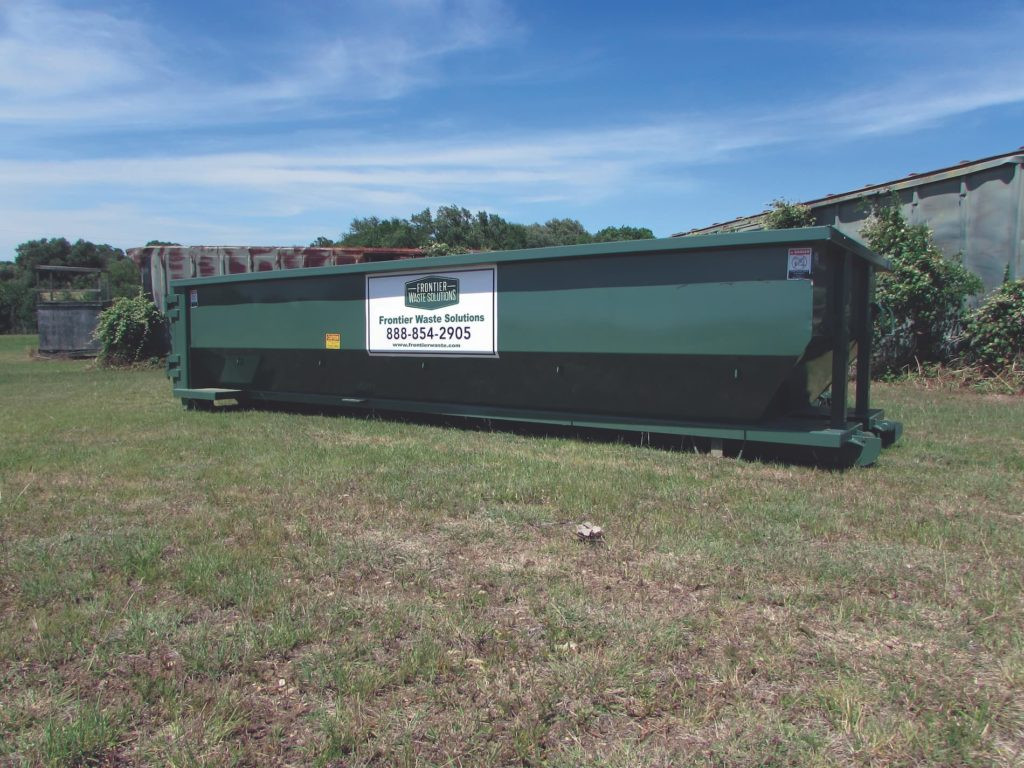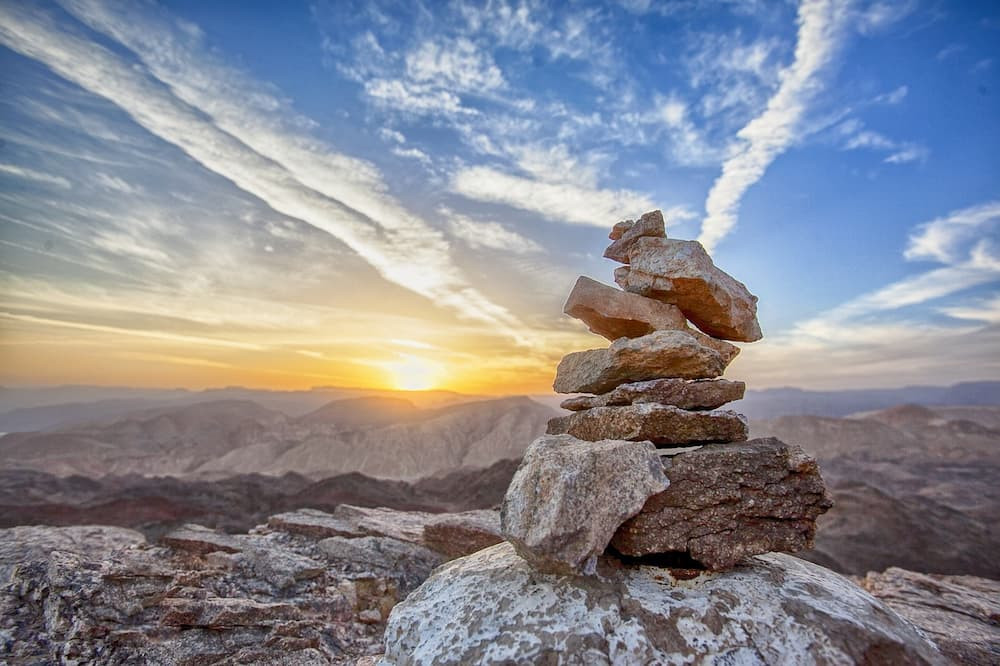Disposing of rocks in your yard doesn’t have to be a headache. This comprehensive guide from rockscapes.net will provide you with legal and eco-friendly strategies for rock disposal, ensuring your landscaping project goes smoothly. Discover innovative rock disposal solutions, various recycling options, and creative ways to repurpose those unwanted stones.
1. Renting A Roll-Off Dumpster For Rock Disposal
Renting a roll-off dumpster is a practical choice for handling substantial amounts of rocks from yard projects or renovations. Frontier Waste Solutions, and similar companies, offer convenient dumpster delivery and pickup services.
To arrange a dumpster rental, simply request a quote and schedule a suitable delivery and pickup time. Keep in mind that dumpster rentals have weight restrictions, so for rock disposal, a 20-yard dumpster is usually sufficient. This is the same size often used for concrete disposal, offering ample space for your rock removal needs.
1.1. Advantages Of Dumpster Rental
- Cost Transparency: Know the price before delivery, avoiding surprises.
- Flexible Scheduling: Adaptable rental periods to suit your project timeline.
- Hassle-Free Disposal: The rental company manages the rock disposal process.
- Convenient Service: No need for your presence during delivery or pickup.
- Responsible Disposal: Assurance that rocks are disposed of correctly.
1.2. Drawbacks Of Dumpster Rental
- DIY Loading: Requires you to load the rocks into the dumpster yourself.
- Weight Limits: Restrictions on the total weight that can be placed in the dumpster.
- Bulk Disposal Focus: Best suited for large-scale disposal projects only.
 dumpster rental is the #1 choice when wondering how to dispose of rocks
dumpster rental is the #1 choice when wondering how to dispose of rocks
2. Utilizing Freecycle, Craigslist, And Classified Ads For Rock Removal
Listing your unwanted rocks on platforms like Freecycle, Craigslist, and other classifieds can connect you with contractors, landscapers, or DIY enthusiasts who can repurpose them. These individuals often seek rocks for landscaping projects or to fill problem areas on construction sites.
To find someone interested in your rocks, explore local classifieds such as Freecycle, Craigslist, and Nextdoor. You can also contact local landscaping firms and contractors to gauge their interest in acquiring the rocks or creating your own listing to attract individuals who can use them for DIY initiatives.
2.1. Advantages Of Free Classifieds
- Free Removal: Potential to find someone to take the rocks at no cost.
- Zero Disposal Fees: Avoid paying for rock disposal services.
- Eco-Friendly Option: Provides a rocks and gravel recycling solution.
2.2. Drawbacks Of Free Classifieds
- Time Investment: Requires effort to find someone who needs the rocks.
- Disposal Uncertainty: Rocks may not be disposed of correctly if given to inexperienced individuals.
- Not Ideal for Bulk: Unsuitable for disposing of large quantities of rocks.
3. Self-Disposal Of Rocks At Local Landfills
Taking rocks to your local landfill or dump yourself is another disposal method. This approach works well depending on the size of your load. You’ll need a truck or trailer to haul the rocks to the nearest facility.
It is crucial to contact the facility beforehand to inquire about any restrictions or fees for disposal. While some landfills accept specific materials for free, others may charge a fee. Be aware that many landfills charge by weight and the number of trips you make. Contact your local municipality or visit your city or town’s website to locate the nearest landfill or dump.
3.1. Advantages Of DIY Rock Disposal
- Flexible Timing: Work at your own pace and schedule.
- No Rental Fees: Avoid paying for dumpster rental or removal services.
- Cost-Effective for Small Loads: A low-cost option for disposing of a small amount of debris.
3.2. Drawbacks Of DIY Rock Disposal
- Physically Demanding: Requires physical labor to load and unload the rocks.
- Potential Travel Distance: The nearest dumping site may be far from your location.
- Dumping Fees: You have to pay dumping fees.
- Not Suitable for Large Loads: Unsuitable for disposing of large quantities of rocks.
- Multiple Trips: Requires multiple trips if you have a lot of rocks.
 diy-rock-disposal
diy-rock-disposal
4. Hiring A Junk Removal Company For Rock Disposal
Hiring a junk removal company is an excellent option if you lack the means to haul away rocks or prefer to avoid the hassle of renting a dumpster. Service fees vary depending on the load size and your location.
Most junk removal services provide an on-site estimate to determine the final quote. Many companies also prioritize donation or recycling over landfill disposal for reusable items.
Junk removal companies have their own trucks and handle all the heavy lifting. They come to your home, load up the rocks, and haul them away for proper disposal. Search online or seek recommendations from friends or family to find a reputable junk removal company in your area.
4.1. Advantages Of Junk Removal Services
- Full-Service: Heavy lifting is done for you.
- Responsible Disposal: You don’t have to worry about disposal or recycling.
- Upfront Pricing: Offers an all-inclusive quote upon surveying the site.
- Convenient Scheduling: It can be scheduled on a day that’s convenient for you.
4.2. Drawbacks Of Junk Removal Services
- High Cost: It is an expensive option for large quantities of rocks.
- Variable Pricing: Price is subject to change after evaluation.
- Not Always Eco-Friendly: Not all companies recycle or donate items.
- Scheduling Required: You have to be home when they come to remove the rocks.
5. Giving Away Rocks To Passers-By
Placing a “free” sign next to a pile of rocks by the road or in a park can attract passers-by who may want them. This method is ideal for small amounts of rocks, but it may not work for larger quantities. Ensure the rocks are easily accessible if you are not always available during pickup time.
5.1. Advantages Of Giving Away Rocks
- Completely Free: It’s free to give away.
- Minimal Effort: Very little or no work is involved.
- Good for Small Amounts: It’s a good disposal option to get rid of small amounts of rocks.
5.2. Drawbacks Of Giving Away Rocks
- Uncertain Outcome: It is not a guarantee that someone will take the rocks.
- Not Suitable for Public Disposal: It is not an ideal disposal option to leave the load in public places.
- Ineffective for Bulk: Not suitable for bulk disposal.
 how to get rid of rocks for free
how to get rid of rocks for free
6. Cost Comparison Of Rock Disposal Options
The cost of disposing of rocks will vary depending on the method you choose and the size of the load. Disposal cost is often measured by weight and the number of trips to the landfill or dumping site.
Junk removal companies typically charge based on the volume your rocks occupy in their truck. The average cost to hire a junk removal company ranges from $275 to $600 per trip, with a capacity of up to 2 tons of rocks. Additional trips will be required for larger quantities.
Dumpster rental is usually charged by the number of days you keep the dumpster. Prices range between $329 and $825, averaging $525. Most dumpsters can hold up to 10 tons of rocks, making this option ideal for large amounts but potentially expensive for smaller quantities.
Dumping fees at landfills or transfer stations typically range from $32 to $50 per ton. This is a good option for those who have their means of transporting the rocks, such as a truck or trailer.
Giving away rocks for free is the most cost-effective option. However, success is not guaranteed, and you may need to invest time in finding someone who wants them. This option is best for small to moderate amounts of rocks.
Here’s a comparison of rock disposal costs:
| Disposal Method | Average Cost | Ideal Load Size | Notes |
|---|---|---|---|
| Junk Removal | $275 – $600 per trip | Small to Medium | Volume-based pricing, includes labor |
| Dumpster Rental | $329 – $825 | Large | Price varies by rental period and dumpster size |
| Landfill/Transfer Station | $32 – $50 per ton | Any | Requires own transportation, fees based on weight |
| Giving Away | Free | Small to Medium | Requires effort to find takers, no guarantee all rocks will be taken |
7. Recycling Rocks For Eco-Friendly Landscaping
Recycling rocks is a sustainable way to handle leftover stones, reducing landfill waste and promoting eco-friendly landscaping practices. Here are a few effective methods:
7.1. Using Rocks For DIY Projects
Repurpose rocks and gravel for DIY projects around your home or yard. Use them as drainage rocks in planters, fill gaps between pavers, or create a rock garden. Let your creativity guide you to find projects that make the most of your leftover rocks. According to Arizona State University’s School of Earth and Space Exploration, repurposing materials in landscaping can significantly reduce waste and promote sustainable practices.
 get rid of landscaping rocks by using them in DIY projects
get rid of landscaping rocks by using them in DIY projects
7.2. Consulting Local Landscape Suppliers
Inquire with local landscape suppliers or garden centers about recycling rocks. If your rocks are clean, free of debris, and in good condition, they may accept them for resale. It never hurts to ask and see if they are interested in taking them off your hands. Many suppliers are willing to accept clean rocks and gravel, as reported in the Journal of Sustainable Development.
7.3. Donating Rocks To Charitable Organizations
Donate your rocks to local charitable organizations like Habitat for Humanity ReStore, which may use them for construction projects. Contact the organization in advance to inquire about their interest and the types of rocks they can accept. These donations can greatly assist community projects, as highlighted by the National Center for Charitable Statistics.
8. Innovative Rock Disposal And Recycling Ideas
Beyond the standard methods, consider these creative approaches to rock disposal and recycling:
8.1. Creating Gabion Walls
Use leftover rocks to build gabion walls for retaining soil or creating decorative landscape features. Gabion walls are cages filled with rocks that provide structural support and visual appeal.
8.2. Building Rock Mulch
Utilize crushed rocks as mulch around plants to retain moisture, suppress weeds, and add a decorative touch to your garden.
8.3. Designing Dry Creek Beds
Construct dry creek beds in your yard to manage drainage and add visual interest. Rocks can be used to line the creek bed and create a natural-looking water feature.
8.4. Making Stone Pathways
Create stone pathways or walkways using flat rocks or pavers. This is a practical and attractive way to use up leftover stones.
8.5. Establishing Rock Gardens
Design a rock garden featuring a variety of rocks and drought-tolerant plants. This low-maintenance garden style is perfect for using up rocks of different sizes and shapes.
8.6. Participating In Community Rock Swaps
Organize or participate in community rock swaps where people can exchange unwanted rocks and landscaping materials. This fosters community engagement and reduces waste.
9. The Environmental Impact Of Rock Disposal
Proper rock disposal is crucial for minimizing environmental impact. Landfilling rocks can contribute to landfill overcrowding and potential soil contamination. Recycling and repurposing rocks reduces the need for new material extraction, conserving natural resources and energy.
9.1. Landfill Overcrowding
Dumping rocks in landfills takes up valuable space that could be used for other waste materials. Overcrowded landfills can lead to environmental issues such as methane emissions and groundwater contamination.
9.2. Soil Contamination
Improperly disposed rocks can leach harmful substances into the soil, contaminating the surrounding environment. This can negatively affect plant growth and water quality.
9.3. Resource Conservation
Recycling rocks reduces the demand for new rock extraction, which requires energy-intensive processes like quarrying and transportation. By repurposing rocks, we conserve natural resources and reduce carbon emissions.
9.4. Energy Savings
Recycling rocks requires less energy than producing new rocks. This helps lower greenhouse gas emissions and reduces our carbon footprint.
10. Frequently Asked Questions About Rock Disposal
Here are some common questions about rock disposal:
10.1. How Can I Get Rid Of Rocks For Free?
You can sell them or give them away by posting ads online or putting up flyers in your neighborhood. You can also try using social media platforms like Nextdoor to give away items for free in your community.
10.2. What Can I Do With Old Landscaping Rocks?
There are a few different things you can do with old landscaping rocks, such as using them for your DIY projects, taking them to a landscape supplier or garden center, donating them to a local charitable organization, or selling them online or giving them away for free.
10.3. Can I Mix Rocks With Other Materials In A Dumpster?
Disposal guidelines for rocks vary by state and municipality, and each company has its policies. In some cases, you may be able to mix other types of debris, such as bricks or concrete, with your rocks in a roll-off dumpster. However, it is always best to check with a customer service representative beforehand to avoid any issues.
10.4. Where Can I Dump Rocks Near Me?
You can dump rocks and debris at recycling stations and local landfills that accept construction and demolition debris, Habitat for Humanity ReStores, local garden centers or landscape suppliers that sell landscaping rocks, and transfer stations and home improvement facilities dealing with construction debris. Enquire before going to any of these places to ensure they accept rocks and gravel, as well as find out about their fees.
10.5. Is It Illegal To Dump Rocks On Public Property?
Yes, dumping rocks or any other materials on public property is generally illegal and can result in fines and penalties. Always dispose of rocks in designated areas or through approved methods.
10.6. How Do I Estimate The Weight Of My Rocks For Disposal?
Estimate the volume of rocks you have and multiply it by the average weight per cubic foot of the type of rock you have. A general estimate is that a cubic foot of rock weighs between 100 and 150 pounds.
10.7. Can I Use Rocks To Improve Soil Drainage?
Yes, rocks can be used to improve soil drainage by creating a layer of gravel or crushed rock at the bottom of planting beds or containers. This helps prevent waterlogging and promotes healthy root growth.
10.8. What Types Of Rocks Are Best For Landscaping?
The best types of rocks for landscaping depend on your aesthetic preferences and the specific application. Some popular options include river rocks, flagstone, granite, and lava rock.
10.9. How Do I Clean Rocks Before Reusing Them In Landscaping?
Clean rocks by scrubbing them with a brush and soapy water. Rinse thoroughly with a hose to remove any dirt or debris. For stubborn stains, use a pressure washer or a solution of bleach and water.
10.10. Are There Any Restrictions On Using Rocks From Natural Areas In Landscaping?
Yes, many areas have restrictions on removing rocks from natural areas such as beaches, parks, and forests. Check local regulations before collecting rocks from these locations to avoid fines or penalties.
Conclusion: Transforming Rock Disposal Into A Creative Opportunity With Rockscapes.Net
Disposing of rocks in your yard doesn’t have to be a daunting task. By exploring various methods such as dumpster rentals, free classifieds, self-disposal, junk removal services, and creative recycling ideas, you can efficiently manage your unwanted stones. Remember to consider the environmental impact and opt for eco-friendly solutions whenever possible. Whether you’re looking to build a stunning rock garden, create a gabion wall, or simply clear out space in your yard, there’s a rock disposal solution that fits your needs. For more inspiration and resources, visit rockscapes.net.
Ready to transform your landscape with stunning rock features? Rockscapes.net offers a wide range of natural stones, innovative design ideas, and expert advice to help you create the outdoor space of your dreams. Contact us today and let our team assist you with your rock disposal and landscaping needs:
Address: 1151 S Forest Ave, Tempe, AZ 85281, United States
Phone: +1 (480) 965-9011
Website: rockscapes.net
Visit rockscapes.net today to discover the beauty and possibilities of rock landscaping!